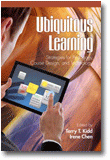
Ubiquitous Learning
Strategies for Pedagogy, Course Design and Technology
Edited by:
Terry T. Kidd, Texas A&M University
Irene Chen, University of Houston-Downtown
Published 2011
Ubiquitous Learning: Strategies for Pedagogy, Course Design, and Technology bridges the gap between digital media and education, by presenting an intriguing look on the future of education. By combining theory, research, and practice, this book paints a broad picture of the field of ubiquitous learning by focuses on how to use theory and research to enhance technology integration to support teaching and learning through instructional design strategies for instruction, models and frameworks for course design, and applications of mobile and social media tools to create, implement, and deliver a ubiquitous learning environment.
This book is of interest to researchers and graduate students in educational technology, information sciences, adult learning and other learning and performance fields, as well as university faculty, teachers, administrators, policymakers, and industry leaders, who can use this text to make essential decisions related to their respective roles in education.
Ubiquitous Learning: Strategies for Pedagogy, Course Design, and Technology is a great reference for those who wish to enhance their levels of teaching and student engagement though the use of technology.
CONTENTS
Acknowledgements. Preface. PART I: INTRODUCTION TO U-LEARNING: PROCESS, PEDAGOGY, AND PRACTICE. The Pedagogy of Things: Ubiquitous Learning, Student Culture, and Constructivist Pedagogical Practice, C. Edward Watson and William O. Plymale. A Process-Oriented Pedagogy for Ubiquitous Learning, Philip Bonanno. Ubiquitous Learning: Issues in the Australian Higher Education Context, Trish Andrews, Belinda Tynan, and Cherry Stewart. PART II: SOCIAL MEDIA + MOBILE LEARNING = U-LEARNING: CREATING CLASSROOM CONNECTIONS. Micro-Cycles: Course Design Model for Mobile Learning, Chris Haskell and Barbara Schroeder. Various Supporting Devices in Ubiquitous Learning, Victor Jengchung Chen and Andree E. Widjaja. Social Media, Story Stream + the University Classroom, Brad King. Social Networks: Pedagogical Tool or Pedagogical Threat? Keith J. Benson and Josephine A. Koster. Is the iPhone a Ubiquitous Learning Device? First Step Toward Digital Lecture Notes, Martin Ebner and Thomas Billicsich. Remote Laboratories and Mobile Devices, Javier Garcia-Zubia, Jaime Irurzun, Pablo Orduña, and Diego López-de-Ipiña. PART III: A NEW DIRECTION TOWARD TEACHING AND LEARNING: UBIQUITOUS LEARNING. A New Learning Environment Based on Reproducible Ubiquitous Computing: Experiences and Prospects, Patrick Wessa, Ian E. Holliday, and Peter Reddy. The Good Teacher: Effective Teaching Strategies for a Ubiquitous Learning Environment, Torria Bond. Helping Your Lecturers to Creatively Introduce Ubiquitous Computing Technologies into Their Teaching: What Every Lecturer Should Know, Lisa-Dionne Morris. Pedagogical Use of Video Podcast in Engineering: Teaching, Learning, and Assessment, Ying Xiong and Imin Kao. Ubiquitous Mathematics from South Africa to Finland: Does Reverse Transfer Work? Temu H. Laine, Eeva Nygren, Erkki Sutinem, Carolina Islas Sedano, Mike Joy, and Seugnet Blignaut. Case Study: Using Flickr in Design Education, Diane Robbie and Lynette Zeeng. Global Perspectives of U-Learning, Dallas McPheeters. The Future as a Ubiquitous Learning Opportunity, Kay E. Strong and Peter C. Bishop. About the Editors. Glossary of Terms.
REVIEWS
"The editors' stated goal for the book is to arouse readers' interest in u-learning, to help them grasp the potential, and to spur action plans to implement u-learning practices. By providing an ample variety of rigorously cited and interesting chapters, the editors have succeeded in thir endeavor. Ubiquitous Learning has provided wide-ranging examples of constructivist u-learning to inspire readers while realistically addressing critical issues that must be considered for u-learning project success. Higher-education constituents will find chapters relevant to their circumstances enabling them to tackly ubiquitous learning endeavors more creatively and effectively." Lin Muilenburh St. Mary's College of Maryland in Am. Journal of Distance Education
"Ubiquitous Learning takes a philosophical stance in favor of a constructivist pedagogy, which is learner-centered. Opportunities for uLearning are evaluated according to their potential to support active and interactive learner-centered instruction." Amy Erickson Iliff School of Theology in Teaching Theology and Religion
-
Paperback978-1-61735-435-9
Web price: $45.04 (Reg. 52.99)
-
Hardcover978-1-61735-436-6
Web price: $80.74 (Reg. 94.99)
- eBook9781617354373

- EDU001000 - EDUCATION: ADMINISTRATION: General
- EDU037000 - EDUCATION: Research
- EDU039000 - EDUCATION: Computers & Technology
-
 (Re)Envisioning Social Studies Education Research
Current Epistemological and Methodological Expansions, Deconstructions, and Creations
(Re)Envisioning Social Studies Education Research
Current Epistemological and Methodological Expansions, Deconstructions, and Creations
-
 Distance Learning
Volume 20 #3
Distance Learning
Volume 20 #3
-
 Distance Learning
Volume 20 #4
Distance Learning
Volume 20 #4
-
 Diversity as Strategic Opportunity
Exploring New Paths to Good Administration
Diversity as Strategic Opportunity
Exploring New Paths to Good Administration
-
 Innovations in Computational Intelligence, Big Data Analytics and Internet of Things
Innovations in Computational Intelligence, Big Data Analytics and Internet of Things
-
 Machine Learning, Natural Language Processing, and Psychometrics
Machine Learning, Natural Language Processing, and Psychometrics
-
 Qualitative Research With Diverse and Underserved Communities
Qualitative Research With Diverse and Underserved Communities

